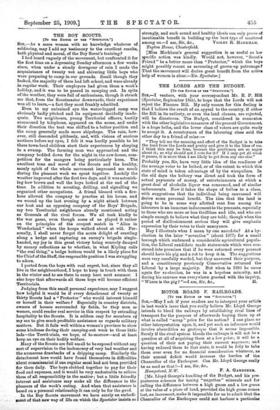THE LORDS AND THE BUDGET.
[To TER Enrroa OF TEN "svEcrevea."] SIR,—I venture, with your correspondent Mr. E. P. Hill (Spectator, September 18th), to hope that the Lords will not reject the Finance Bill. My only reason for this feeling is
that I believe the result of an appeal to the country, if either the Bill in its entirety, or even the land clauses, are rejected, will be disastrous. The Budget, considered in connexion with the other legislative measures of the present Government, is a huge bribe, and the lower class of voters are quite ready to accept it. A countryman of the labouring class said the other clay to a friend of mine :—
" They tell me the meaning and effect of the Budget is to take the land from the Lords and gentry and give it to the likes of me. I think this may be true, because the gentlemen are so angry about it; so why should not I vote for it ? If I only get .e5 when it passes, it is more than I am likely to get from any one else."
Probably you, Sir, have very little idea of the readiness of the average voter to be bribed, or of the extent to which this state of mind is taken advantage of by the wirepullers. In
the old days the bribery was direct and took the form of actual payments of money, of entertainments at which a great deal of alcoholic liquor was consumed, and of similar
inducements. Now it takes the shape of bribes to a class, with suggestions that the individual being canvassed will derive some personal benefit. The idea that the land is going to be in some way allotted rent free among the labourers is an immense inducement to the peasants, especially to those who are more or less thriftless and idle, and who are simple enough to believe what they are told; though when the period of disillusionment arrives they will give emphatic expression by their votes to their annoyance.
May I illustrate what I mean by one anecdote ? At a by- election in the later " seventies " (about 1877) for a small borough which embraced a considerable agricultural popula- tion, the Liberal candidate made statements which were con- strued into promises that if he were returned every peasant should have his pig and a cot to keep it in. The suggestions were very carefully worded, but they answered their purpose, and a constituency previously Conservative returned the Liberal by a large majority. But when in 1880 he came again for re-election, he was in a hopeless minority, and during his canvass was everywhere greeted with the inquiry,
" Where is the pig ? "—I am, Sir, &c., H.










































 Previous page
Previous page